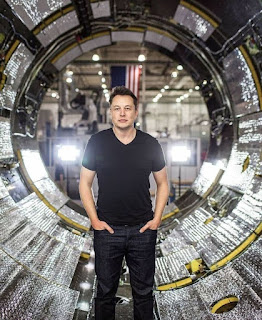The Genius Way Of Thinking Like Elon Musk
This list doesn’t even include Solar City (Energy), which he helped build and acquired for $2.6 Billion recently.
At first glance, it’s easy to link his rapid success, ability to solve unsolvable problems and genius level creativity to his incredible work ethic.
Musk himself stated that he worked approximately 100 hours a week for over 15 years and recently scaled down to 85 hours. Rumour also has it that he doesn’t even take lunch breaks, multitasking between eating, meetings and responding to emails all at the same time.
No doubt work ethic plays an important role in unlocking your inner creative genius and becoming the best at what you do — but there’s more to this — there are extremely hard-working people who still make little progress in life and die before sharing their best work with the world.
What then is this missing link for innovative creativity and accelerated success?
Just like Musk, some of the most brilliant minds of all-time — Aristotle, Euclid, Thomas Edison, Feynman and Nikola Tesla — use this missing link for accelerated learning, solving difficult problems and creating great work in their lifetime.
This missing link has little to do with how hard they work. It has everything to do with how they think.
Let’s talk about how you can quickly use this genius problem solving method.
First Principles Thinking
During a one on one interview with TED Curator, Chris Anderson, Musk reveals this missing link which he attributes to his genius level creativity and success. It’s called reasoning from “First Principles.” [1]
Musk: Well, I do think there’s a good framework for thinking. It is physics. You know, the sort of first principles reasoning. Generally I think there are — what I mean by that is, boil things down to their fundamental truths and reason up from there, as opposed to reasoning by analogy.
Through most of our life, we get through life by reasoning by analogy, which essentially means copying what other people do with slight variations.
In layman’s terms, first principles thinking is basically the practice of actively questioning every assumption you think you ‘know’ about a given problem or scenario — and then creating new knowledge and solutions from scratch. Almost like a newborn baby.
On the flip side, reasoning by analogy is building knowledge and solving problems based on prior assumptions, beliefs and widely held ‘best practices’ approved by majority of people.
People who reason by analogy tend to make bad decisions, even if they’re smart.
Essentially, first principles thinking will help you develop a unique worldview to innovate and solve difficult problems in a way that nobody else can even fathom.
Here’s how you can quickly use this in 3 simple steps recommended by Elon Musk himself.
STEP 1: Identify and define your current assumptions.
STEP 2: Breakdown the problem into its fundamental principles.
STEP 3: Create new solutions from scratch.







Comments
Post a Comment